HUCL1101 Role Concepts in Health Care: Needs and Time Management
VerifiedAdded on 2023/06/04
|5
|1177
|410
Case Study
AI Summary
This case study analysis explores the unmet needs of Carla, a healthcare professional, through the lens of Maslow's hierarchy, including safety, social, self-esteem, and self-actualization needs. The analysis delves into how these unmet needs affect Carla's well-being, identifying unhealthy coping mechanisms like alcohol consumption and suggesting healthier alternatives such as seeking assistance and stress management. The study also addresses time management issues stemming from Carla taking on অতিরিক্ত workload and proposes solutions involving better communication, defined scopes of practice, and management intervention to address workplace harassment. References to relevant academic articles support the discussion, highlighting the importance of a supportive environment and effective communication in healthcare settings.
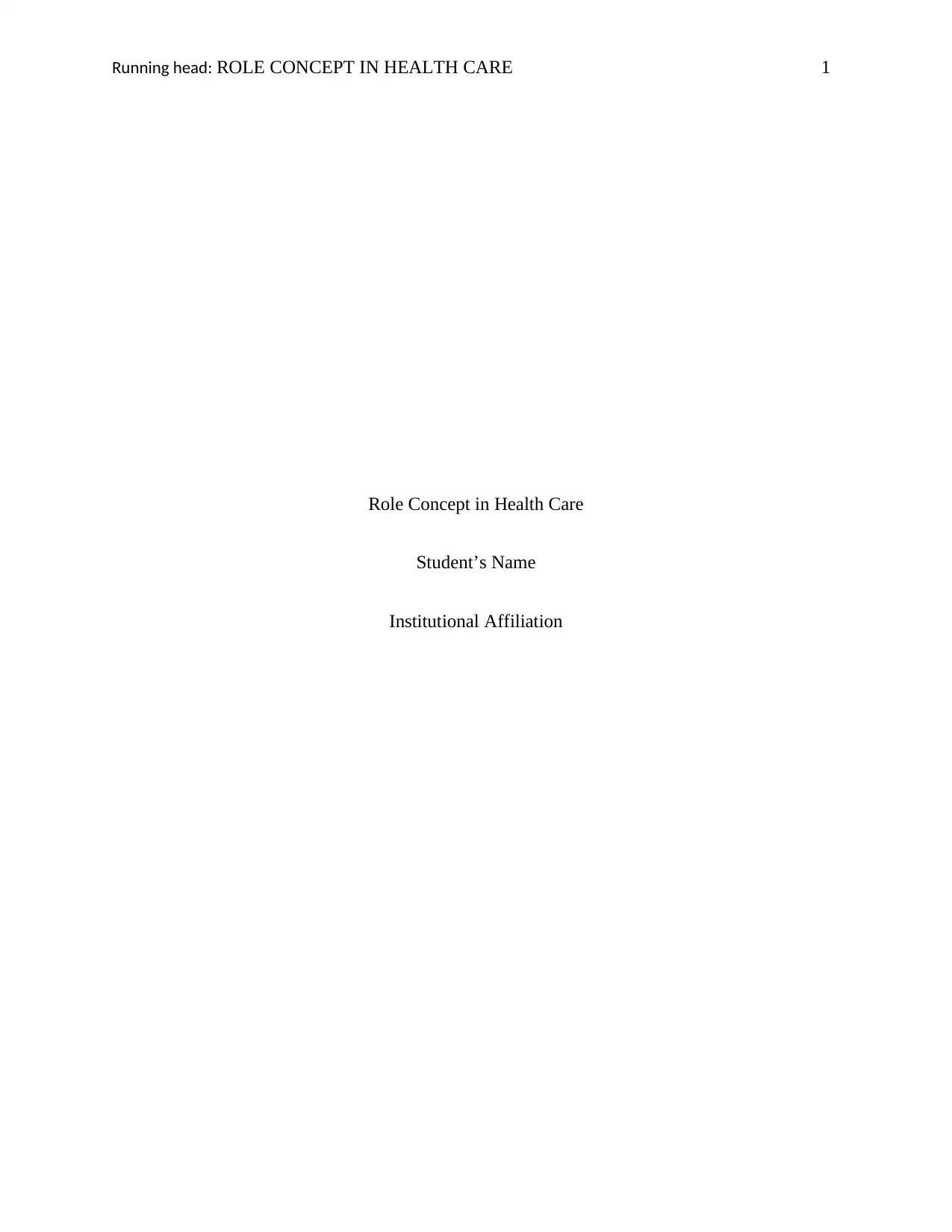
Running head: ROLE CONCEPT IN HEALTH CARE 1
Role Concept in Health Care
Student’s Name
Institutional Affiliation
Role Concept in Health Care
Student’s Name
Institutional Affiliation
Paraphrase This Document
Need a fresh take? Get an instant paraphrase of this document with our AI Paraphraser
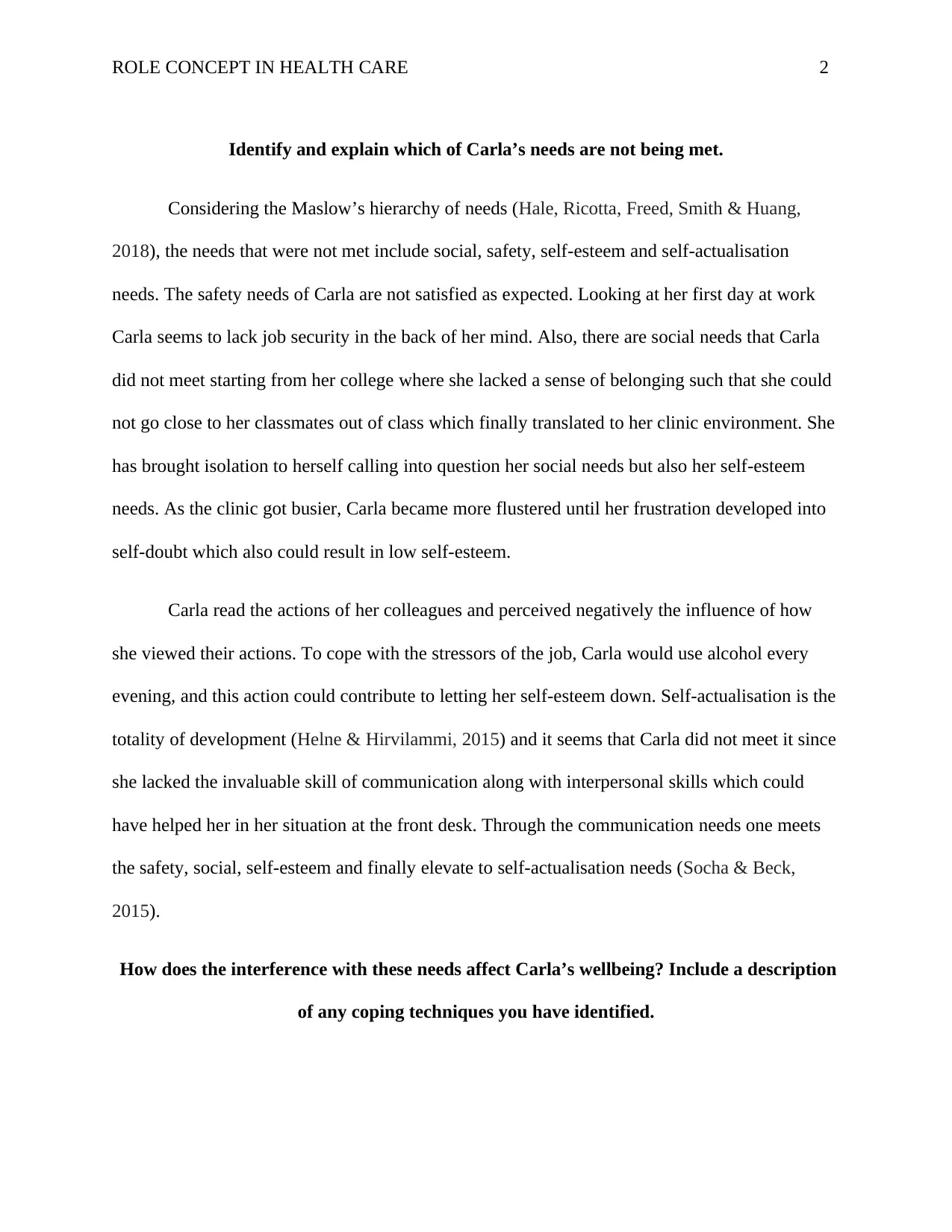
ROLE CONCEPT IN HEALTH CARE 2
Identify and explain which of Carla’s needs are not being met.
Considering the Maslow’s hierarchy of needs (Hale, Ricotta, Freed, Smith & Huang,
2018), the needs that were not met include social, safety, self-esteem and self-actualisation
needs. The safety needs of Carla are not satisfied as expected. Looking at her first day at work
Carla seems to lack job security in the back of her mind. Also, there are social needs that Carla
did not meet starting from her college where she lacked a sense of belonging such that she could
not go close to her classmates out of class which finally translated to her clinic environment. She
has brought isolation to herself calling into question her social needs but also her self-esteem
needs. As the clinic got busier, Carla became more flustered until her frustration developed into
self-doubt which also could result in low self-esteem.
Carla read the actions of her colleagues and perceived negatively the influence of how
she viewed their actions. To cope with the stressors of the job, Carla would use alcohol every
evening, and this action could contribute to letting her self-esteem down. Self-actualisation is the
totality of development (Helne & Hirvilammi, 2015) and it seems that Carla did not meet it since
she lacked the invaluable skill of communication along with interpersonal skills which could
have helped her in her situation at the front desk. Through the communication needs one meets
the safety, social, self-esteem and finally elevate to self-actualisation needs (Socha & Beck,
2015).
How does the interference with these needs affect Carla’s wellbeing? Include a description
of any coping techniques you have identified.
Identify and explain which of Carla’s needs are not being met.
Considering the Maslow’s hierarchy of needs (Hale, Ricotta, Freed, Smith & Huang,
2018), the needs that were not met include social, safety, self-esteem and self-actualisation
needs. The safety needs of Carla are not satisfied as expected. Looking at her first day at work
Carla seems to lack job security in the back of her mind. Also, there are social needs that Carla
did not meet starting from her college where she lacked a sense of belonging such that she could
not go close to her classmates out of class which finally translated to her clinic environment. She
has brought isolation to herself calling into question her social needs but also her self-esteem
needs. As the clinic got busier, Carla became more flustered until her frustration developed into
self-doubt which also could result in low self-esteem.
Carla read the actions of her colleagues and perceived negatively the influence of how
she viewed their actions. To cope with the stressors of the job, Carla would use alcohol every
evening, and this action could contribute to letting her self-esteem down. Self-actualisation is the
totality of development (Helne & Hirvilammi, 2015) and it seems that Carla did not meet it since
she lacked the invaluable skill of communication along with interpersonal skills which could
have helped her in her situation at the front desk. Through the communication needs one meets
the safety, social, self-esteem and finally elevate to self-actualisation needs (Socha & Beck,
2015).
How does the interference with these needs affect Carla’s wellbeing? Include a description
of any coping techniques you have identified.
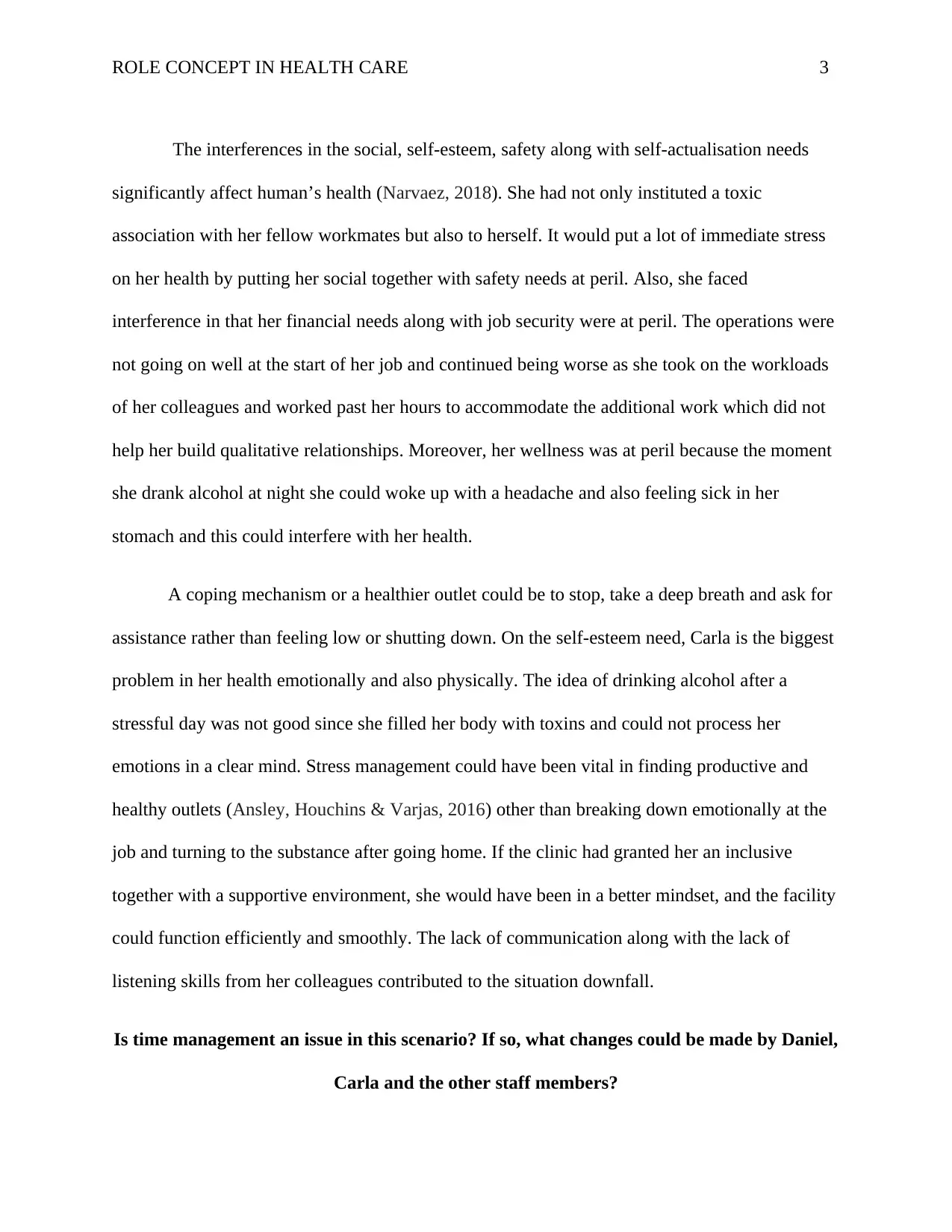
ROLE CONCEPT IN HEALTH CARE 3
The interferences in the social, self-esteem, safety along with self-actualisation needs
significantly affect human’s health (Narvaez, 2018). She had not only instituted a toxic
association with her fellow workmates but also to herself. It would put a lot of immediate stress
on her health by putting her social together with safety needs at peril. Also, she faced
interference in that her financial needs along with job security were at peril. The operations were
not going on well at the start of her job and continued being worse as she took on the workloads
of her colleagues and worked past her hours to accommodate the additional work which did not
help her build qualitative relationships. Moreover, her wellness was at peril because the moment
she drank alcohol at night she could woke up with a headache and also feeling sick in her
stomach and this could interfere with her health.
A coping mechanism or a healthier outlet could be to stop, take a deep breath and ask for
assistance rather than feeling low or shutting down. On the self-esteem need, Carla is the biggest
problem in her health emotionally and also physically. The idea of drinking alcohol after a
stressful day was not good since she filled her body with toxins and could not process her
emotions in a clear mind. Stress management could have been vital in finding productive and
healthy outlets (Ansley, Houchins & Varjas, 2016) other than breaking down emotionally at the
job and turning to the substance after going home. If the clinic had granted her an inclusive
together with a supportive environment, she would have been in a better mindset, and the facility
could function efficiently and smoothly. The lack of communication along with the lack of
listening skills from her colleagues contributed to the situation downfall.
Is time management an issue in this scenario? If so, what changes could be made by Daniel,
Carla and the other staff members?
The interferences in the social, self-esteem, safety along with self-actualisation needs
significantly affect human’s health (Narvaez, 2018). She had not only instituted a toxic
association with her fellow workmates but also to herself. It would put a lot of immediate stress
on her health by putting her social together with safety needs at peril. Also, she faced
interference in that her financial needs along with job security were at peril. The operations were
not going on well at the start of her job and continued being worse as she took on the workloads
of her colleagues and worked past her hours to accommodate the additional work which did not
help her build qualitative relationships. Moreover, her wellness was at peril because the moment
she drank alcohol at night she could woke up with a headache and also feeling sick in her
stomach and this could interfere with her health.
A coping mechanism or a healthier outlet could be to stop, take a deep breath and ask for
assistance rather than feeling low or shutting down. On the self-esteem need, Carla is the biggest
problem in her health emotionally and also physically. The idea of drinking alcohol after a
stressful day was not good since she filled her body with toxins and could not process her
emotions in a clear mind. Stress management could have been vital in finding productive and
healthy outlets (Ansley, Houchins & Varjas, 2016) other than breaking down emotionally at the
job and turning to the substance after going home. If the clinic had granted her an inclusive
together with a supportive environment, she would have been in a better mindset, and the facility
could function efficiently and smoothly. The lack of communication along with the lack of
listening skills from her colleagues contributed to the situation downfall.
Is time management an issue in this scenario? If so, what changes could be made by Daniel,
Carla and the other staff members?
⊘ This is a preview!⊘
Do you want full access?
Subscribe today to unlock all pages.

Trusted by 1+ million students worldwide
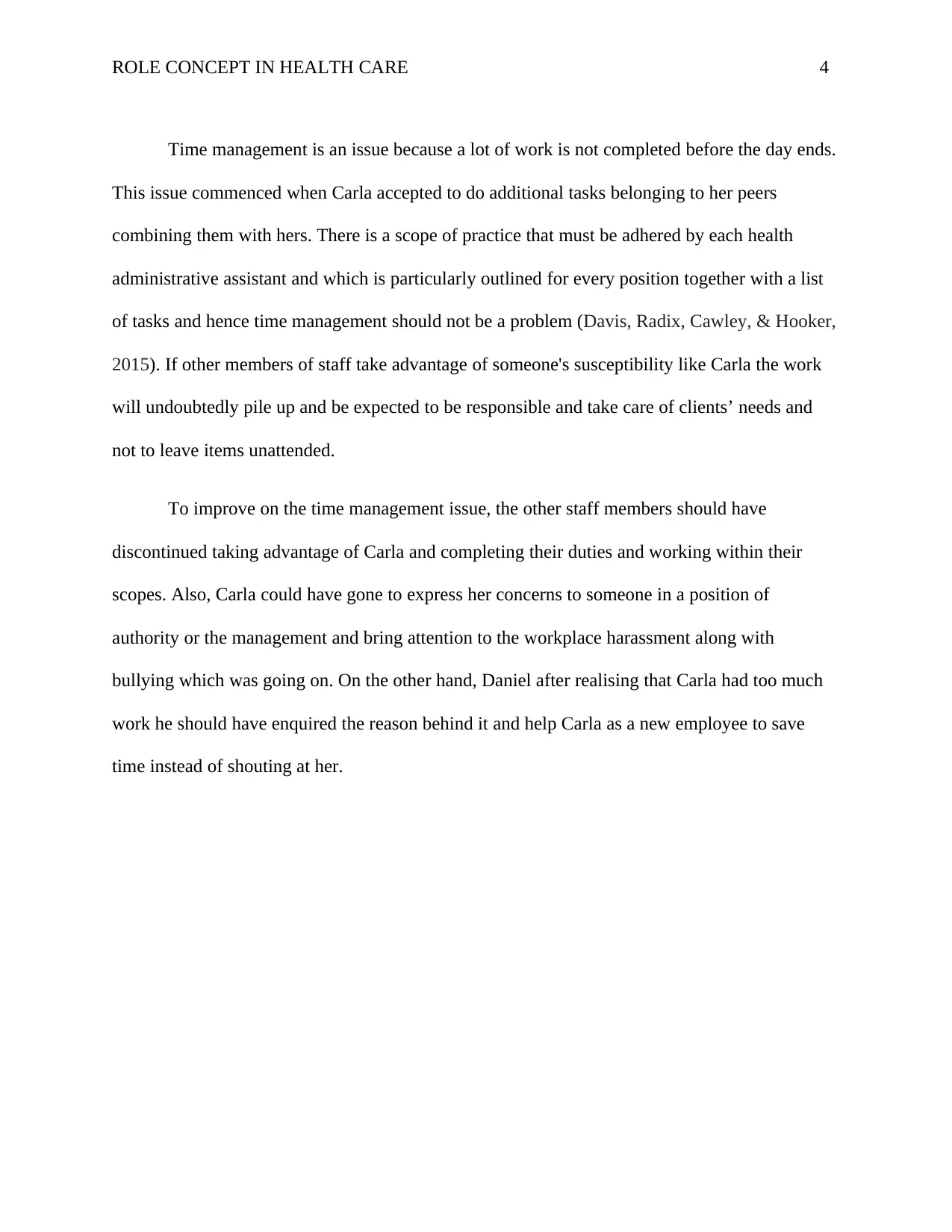
ROLE CONCEPT IN HEALTH CARE 4
Time management is an issue because a lot of work is not completed before the day ends.
This issue commenced when Carla accepted to do additional tasks belonging to her peers
combining them with hers. There is a scope of practice that must be adhered by each health
administrative assistant and which is particularly outlined for every position together with a list
of tasks and hence time management should not be a problem (Davis, Radix, Cawley, & Hooker,
2015). If other members of staff take advantage of someone's susceptibility like Carla the work
will undoubtedly pile up and be expected to be responsible and take care of clients’ needs and
not to leave items unattended.
To improve on the time management issue, the other staff members should have
discontinued taking advantage of Carla and completing their duties and working within their
scopes. Also, Carla could have gone to express her concerns to someone in a position of
authority or the management and bring attention to the workplace harassment along with
bullying which was going on. On the other hand, Daniel after realising that Carla had too much
work he should have enquired the reason behind it and help Carla as a new employee to save
time instead of shouting at her.
Time management is an issue because a lot of work is not completed before the day ends.
This issue commenced when Carla accepted to do additional tasks belonging to her peers
combining them with hers. There is a scope of practice that must be adhered by each health
administrative assistant and which is particularly outlined for every position together with a list
of tasks and hence time management should not be a problem (Davis, Radix, Cawley, & Hooker,
2015). If other members of staff take advantage of someone's susceptibility like Carla the work
will undoubtedly pile up and be expected to be responsible and take care of clients’ needs and
not to leave items unattended.
To improve on the time management issue, the other staff members should have
discontinued taking advantage of Carla and completing their duties and working within their
scopes. Also, Carla could have gone to express her concerns to someone in a position of
authority or the management and bring attention to the workplace harassment along with
bullying which was going on. On the other hand, Daniel after realising that Carla had too much
work he should have enquired the reason behind it and help Carla as a new employee to save
time instead of shouting at her.
Paraphrase This Document
Need a fresh take? Get an instant paraphrase of this document with our AI Paraphraser
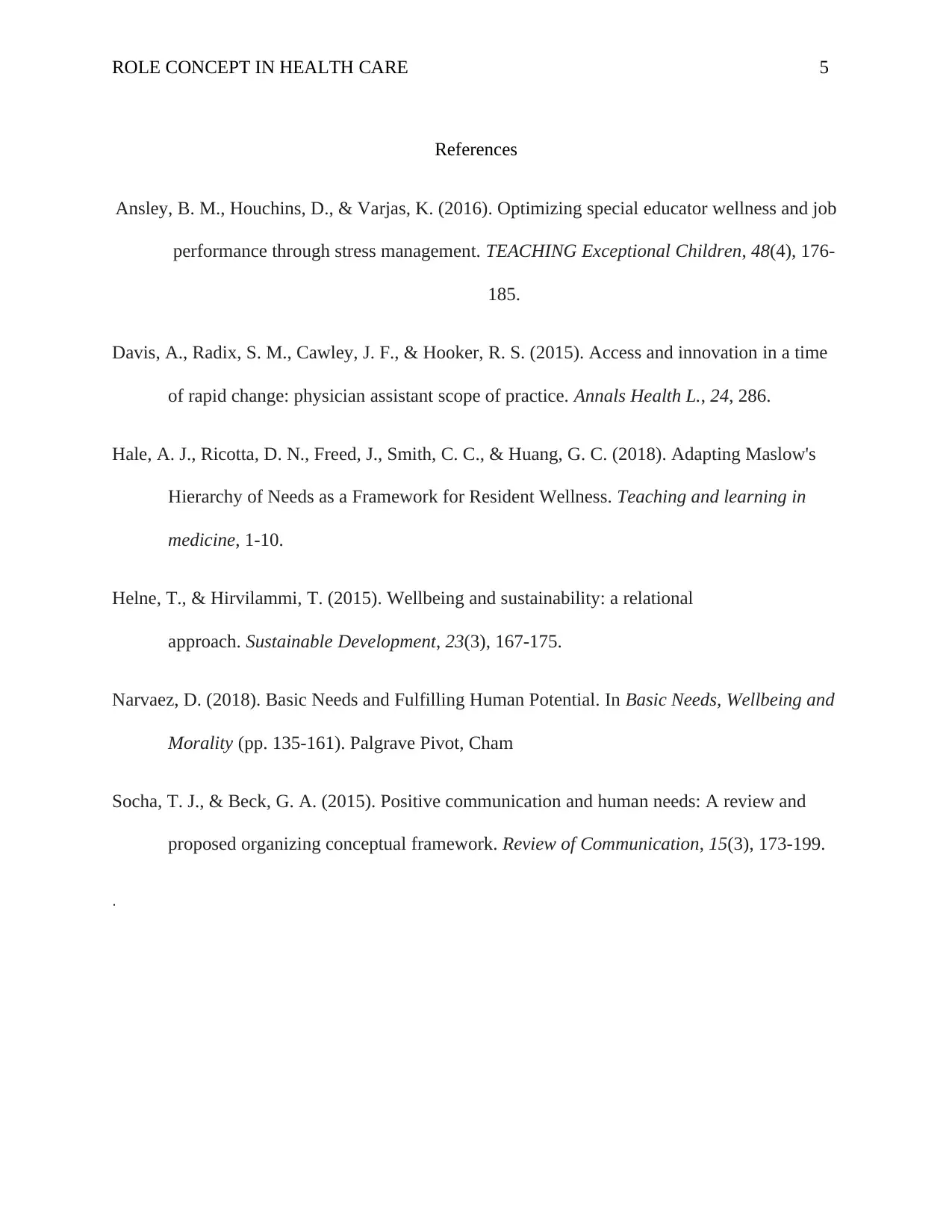
ROLE CONCEPT IN HEALTH CARE 5
References
Ansley, B. M., Houchins, D., & Varjas, K. (2016). Optimizing special educator wellness and job
performance through stress management. TEACHING Exceptional Children, 48(4), 176-
185.
Davis, A., Radix, S. M., Cawley, J. F., & Hooker, R. S. (2015). Access and innovation in a time
of rapid change: physician assistant scope of practice. Annals Health L., 24, 286.
Hale, A. J., Ricotta, D. N., Freed, J., Smith, C. C., & Huang, G. C. (2018). Adapting Maslow's
Hierarchy of Needs as a Framework for Resident Wellness. Teaching and learning in
medicine, 1-10.
Helne, T., & Hirvilammi, T. (2015). Wellbeing and sustainability: a relational
approach. Sustainable Development, 23(3), 167-175.
Narvaez, D. (2018). Basic Needs and Fulfilling Human Potential. In Basic Needs, Wellbeing and
Morality (pp. 135-161). Palgrave Pivot, Cham
Socha, T. J., & Beck, G. A. (2015). Positive communication and human needs: A review and
proposed organizing conceptual framework. Review of Communication, 15(3), 173-199.
.
References
Ansley, B. M., Houchins, D., & Varjas, K. (2016). Optimizing special educator wellness and job
performance through stress management. TEACHING Exceptional Children, 48(4), 176-
185.
Davis, A., Radix, S. M., Cawley, J. F., & Hooker, R. S. (2015). Access and innovation in a time
of rapid change: physician assistant scope of practice. Annals Health L., 24, 286.
Hale, A. J., Ricotta, D. N., Freed, J., Smith, C. C., & Huang, G. C. (2018). Adapting Maslow's
Hierarchy of Needs as a Framework for Resident Wellness. Teaching and learning in
medicine, 1-10.
Helne, T., & Hirvilammi, T. (2015). Wellbeing and sustainability: a relational
approach. Sustainable Development, 23(3), 167-175.
Narvaez, D. (2018). Basic Needs and Fulfilling Human Potential. In Basic Needs, Wellbeing and
Morality (pp. 135-161). Palgrave Pivot, Cham
Socha, T. J., & Beck, G. A. (2015). Positive communication and human needs: A review and
proposed organizing conceptual framework. Review of Communication, 15(3), 173-199.
.
1 out of 5
Related Documents
Your All-in-One AI-Powered Toolkit for Academic Success.
+13062052269
info@desklib.com
Available 24*7 on WhatsApp / Email
![[object Object]](/_next/static/media/star-bottom.7253800d.svg)
Unlock your academic potential
Copyright © 2020–2026 A2Z Services. All Rights Reserved. Developed and managed by ZUCOL.





